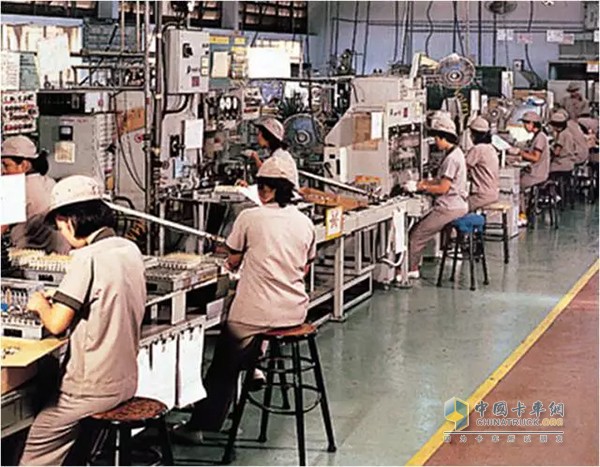 Denso Group's factory in Thailand
Denso Group's factory in Thailand Towards the Asian and Oceanian markets
In the 1960s, Denso started exporting products from the market and entered the Asian and Oceanian markets. Electric outlets are sold and sales of commonly used replenishment components for Japanese automobiles, such as ignition coils, injectors, horns, spark plugs, and other versatile products, are expanded. In the second half of the 1960s, Denso further exported technology to the Philippines and South Korea.
After entering the 70s, Denso continued to open up the market. During this period, the world economy was very unstable due to the transition to a floating exchange rate system and the impact of the first oil crisis. However, Denso did not stop at this point and took the lead in entering the European and American markets, adopting strategies that are consistent with the conditions of the region, and started cooperation with local production.
Initial production of electric equipment on Asian market
In about the same period of the same year, Denso established Japan Denso • Australia (DMAU → Current DNAU), and Australia, like Southeast Asia, started to produce Japanese cars. Product varieties are mainly heaters, radiators, air conditioners and so on. Since then, we have started overseas production projects in Australia that use modern mass production equipment. The use of mass production equipment for the accumulation of on-site production, and European and American style labor relations and other related experience, also played a crucial role in the later development of the United States.
In 1975, similar to Thailand, Denso set up Denso Indonesia (now DNIA) to support local domestic vehicle production incentive policies in response to Indonesia's localization regulations.
In 1976, Denso Philippines (DNPH (cleared) → current PAC) was established in the Philippines and began assembling air conditioners, electrical equipment, instruments and other products. In Korea, Fengxing Precision Co., Ltd. (PSCM → present-day DNKE) has established a joint venture with its technology partner, Fengxing Electric.
In 1980, in order to cope with the strict localization regulations in Malaysia, the company established a joint venture company, Denso Malaysia (now DNMY), and began production of electric products and radiators.
At the end of 1981, Prime Minister Mahathir announced the "National Vehicle Concept", which greatly promoted Malaysia's national vehicle production.
During this period, Denso was not confined to sales, and the production network was expanded from Thailand and Australia to Indonesia, South Korea, the Philippines, and Malaysia. From the 1970s to the 1980s, we continued to implement overseas businesses based on our strong technical capabilities and strict international regulations.
The courage to challenge new markets like this requires imagination, courage, and the unremitting efforts of all employees. Since the establishment of the company for about 20 years, Denso has not only emerged from the period of economic hardship but has also sowed the seeds for the future growth of global companies.
Copper Pyrophosphate,Ferrous Phosphate,High Purity Copper Pyrophosphate,High Purity Ferrous Phosphate
Vietnam Fine Chemical Factory , https://www.link-winchem.com
![<?echo $_SERVER['SERVER_NAME'];?>](/template/twentyseventeen/skin/images/header.jpg)